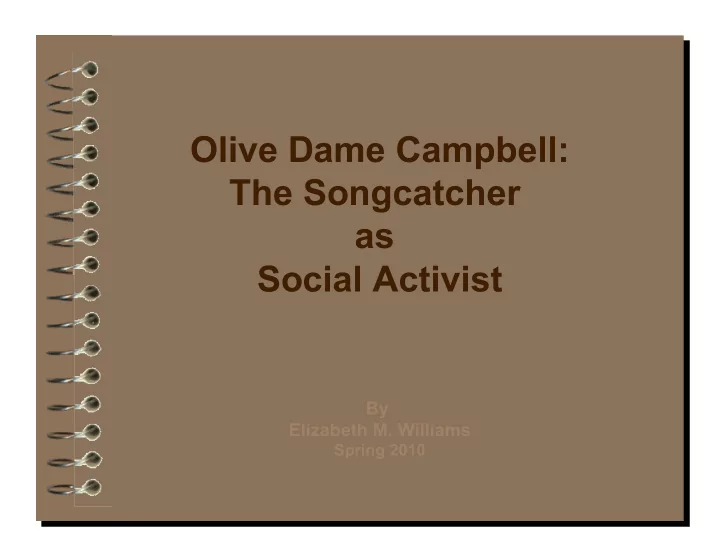

Olive Dame Campbell: The Songcatcher as Social Activist By Elizabeth M. Williams Spring 2010
The Social Survey • Olive Dame Campbell and her husband John C. Campbell, a minister and educator, set out in 1908 to conduct a comprehensive survey of the Southern Highland region under the auspices of the Russell Sage Foundation, a New York organization interested in funding innovative benevolent projects.
Mountain Music • On the trip in December of 1908, Olive Campbell discovered that the old English and Scottish ballads were being sung in the form that first came to this country. Mountaineers refer to anyone who collects songs as a “songcatcher.” • She collected, recorded, and published some of the original tunes and ballads she collected from the women in mountain homes. In 1909 she obtained a grant and compiled several collections.
The Diary: A Trip through the Mountains 1908-1909 • Campbell asked his wife to keep a detailed record of their trip in the latter months of 1908 and the first part of 1909. The original diary is housed with the Campbell papers in the Southern Historical Collection at the University of North Carolina at Chapel Hill.
Fording the River • The diary of the trip is fascinating reading, with harrowing details of the travel difficulties and enthusiastic exclamations about the scenery, as they travelled over the countryside in good weather and bad.
The Southern Highlands Appalachia was a land that was experiencing exponential changes at the turn of the century— social, educational, religious, and economic.
Mountain missions • The diary tells the story of church and educational workers in the field as they engaged in conversations about denominational friction and educational conditions, as well as local mores and health conditions, often primitive. • As an educated, genteel woman from Massachusetts, she was sometimes dismayed by some of the living conditions, social habits, and religious customs she witnessed in the mountains.,
Hard times • The Campbells traveled all over eastern Kentucky, eastern Tennessee, and western North Carolina, by train, wagon, horseback, and even on foot, to determine the true state of affairs. • They visited many mountain community churches and schools, trying to discover how to effectively help the mountain people.
Appalachian History • After her husband’s death, Olive Campbell completed his book • The Southern Highlanders • and Their Homeland (1921), a compilation of the observations he made about the Southern mountain region and its people and the findings of their survey. • It was the first comprehensive history of Appalachia and a classic in the field.
The John C. Campbell Folk School • Both of the Campbells were charmed by the music and crafts which were so much a part of mountain life, hidden in the coves and hollows where few “furriners” wanted or dared to go. • Olive Campbell used the data from the mountain survey to apply Campbell’s philosophy of education to a real life situation. In establishing the John C. Campbell Folk School in Brasstown, North Carolina, in 1925, she fulfilled one of their dreams.
Mountain Crafts • Instrumental in the formation of the Southern Highland Craft Guild, Olive Campbell is portrayed as a major player in the promotion of crafts in Appalachia in Allan Eaton’s Handicrafts of the Southern Highlands (1937) and the more recent Weavers of the Southern Highlands by Allan Eaton: In 1920 Eaton became the Associate Director for the Department of Phylis Alvic, published in Surveys and Exhibits with the Russell Sage 2003. Foundation, where he met the craft school founder Olive Dame Campbell.
The Diary • Olive Dame Campbell’s account of the pioneering investigation of educational, religious, and social conditions among the Southern Highlanders is a valuable contribution to the social, educational, economic, and religious history of the mountain South. • It offers the vivid, personal account of dedicated individuals who were involved in a project that produced the first major investigative social study of the Southern Appalachians.
Olive Dame Campbell: The Songcatcher as Social Activist By Elizabeth M. Williams Spring 2010 Credits: Special thanks to “Craft Revival: Shaping Western North Carolina: Past and Present” from the Hunter Library Digital Collections at Western Carolina University for some of the images used in this presentation. The presentation is not for publication without asking specifically for their permission: http://www.wcu.edu/craftrevival/people/olivecampbell.html
Recommend
More recommend